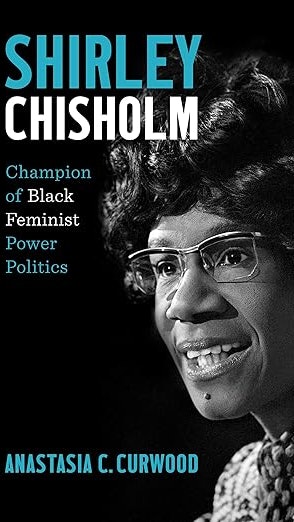Shirley Chisholm: Champion of Black Feminist Power Politics by Dr. Anastasia C. Curwood (The University of North Carolina Press) is a fascinating and timely book that traces the political trajectory of the first African American congresswoman who would later break barriers as the first Black major party presidential candidate..
As we celebrate Black History Month, a close examination of Shirley Chisholm’s rise in progressive politics is not only important, but it is necessary. Chisholm paved the way for the Rev. Jesse Louis Jackson’s historic presidential runs in 1984 and 1988 and the election of a virtually unknown political figure — Barack Obama — in 2008.
 Shirley Chisholm: Champion of Black Feminist Power Politics by Dr. Anastasia C. Curwood was published by The University of North Carolina Press.
Shirley Chisholm: Champion of Black Feminist Power Politics by Dr. Anastasia C. Curwood was published by The University of North Carolina Press.
Curwood, an associate professor of history and director of African American and Africana Studies at the University of Kentucky, introduces readers to a young Chisholm — not the feisty politician that she would become or the elder stateswoman that would mark her later years. The daughter of Caribbean parents, Curwood points out that as a young girl, Chisholm — who was born Nov. 30, 1924, in Brooklyn, New York — was deeply influenced by Eleanor Roosevelt and educator and civil rights leader, Mary McLeod Bethune.
“Late in life, Chisholm would credit Roosevelt, Bethune, and her grandmother Emmeline Seale as the three women who had the most influence on her,” writes Curwood. “Bethune and Roosevelt shared with Chisholm the belief that the government ought to work in the service of the people, including women.”
That kind of advocacy would guide Chisholm’s own advocacy across the years as a New York assemblywoman and later as a congresswoman. Along the way, Chisholm developed what Curwood describes as “Black feminist power politics” that would define much of her career. In addition to supporting a progressive political agenda that included championing antipoverty and antiracism programs, she prioritized support for women’s issues such as abortion rights.
“Chisholm’s years in the assembly were also the beginning years of the so-called second wave women’s movement,” notes Curwood, who brilliantly parallels Chisholm’s life with the social and political movements of the day. “It was through the women’s movement that Chisholm would raise her national profile.”




















